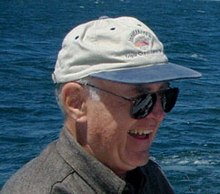This is an old revision of this page, as edited by 206.77.0.156 (talk) at 21:06, 22 August 2005. The present address (URL) is a permanent link to this revision, which may differ significantly from the current revision.
Revision as of 21:06, 22 August 2005 by 206.77.0.156 (talk)(diff) ← Previous revision | Latest revision (diff) | Newer revision → (diff)--206.77.0.156 21:06, 22 August 2005 (UTC)Media:Example.ogg

Gordon Earl Moore (born January 3, 1929) is co-founder of Intel Corporation and the author of Moore's law (published in an article 19 April 1965 in Electronics Magazine).
Moore was born in San Francisco, California. He received a B.S. degree in Chemistry from the University of California, Berkeley in 1950 and a Ph.D. in Chemistry and Physics from the California Institute of Technology (Caltech) in 1954. Prior to studying at Berkeley, he spent his freshman and sophomore years at San Jose State University, where he met his future wife.
He joined Caltech alumnus William Shockley at the Shockley Semiconductor Laboratory division of Beckman Instruments, but left with the "Traitorous Eight" to create the influential Fairchild Semiconductor corporation.
He co-founded Intel Corporation in July of 1968, serving as Executive Vice President until 1975 when he became President and Chief Executive Officer. In April 1979, Dr. Moore became Chairman of the Board and Chief Executive Officer, holding that position until April 1987, when he became Chairman of the Board. He currently serves as Chairman Emeritus.
In 2001, Moore (who is a Caltech trustee) and his wife donated $600 million to Caltech, the largest gift ever to an institution of higher education. He said that he wants the gift to be used to keep Caltech at the forefront of research and technology.
The library at the Centre for Mathematical Sciences at the University of Cambridge is named after him and his wife Betty.
See also
External links
- Betty and Gordon Moore Library
- Biography at Intel website
- Oral history – As part of the Stanford Silicon Valley Project
- Forbes.com: Forbes World's Richest People
- Yahoo! - Insider trading
- Moore says nanoelectronics face tough challenges – By Michael Kanellos, CNET News.com, 9 March 2005
- A Wired News article